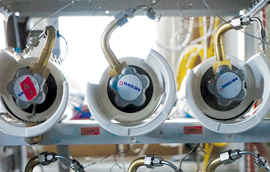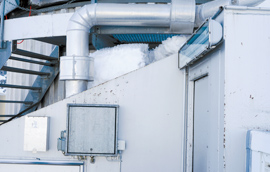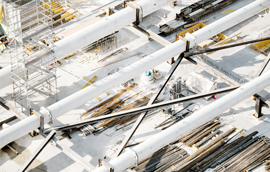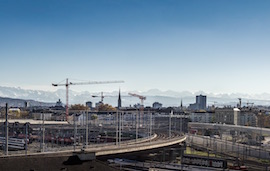Swiss Energy Perspectives 2050+
Within the scope of updating the energy perspectives 2050+, two target scenarios are being developed:
- A new scenario "Business as usual", which reflects the current measures of the Energy Strategy 2050.
- An updated target scenario, which represents a long-term net zero carbon emission target that is aligned with the FOEN and meets the requirements of the Paris Agreement implemented for Switzerland. In addition to the basic version, further alternatives which can be regarded as different forms of "sector coupling" are being calculated for the target scenario. The focus lies on examining the potential for expanding of the district heating network with a higher use of gas or electricity to meet the heating demand.
Project infos
Project duration2018 - 2021
Contact at TEP EnergyMartin Jakob
Contracting partySwiss Federal Office of Energy (SFOE)
Project PartnersPrognos (Lead), TEP Energy, Infras, Ecoplan
FactsheetPDF (only German)
Brief ReportPDF (update March 21, DE)
Special Report on Framework DataPDF (only German)
Special Report Climate ScenarioPDF (only German)
Special Report on CHPPDF (only German)
Special Report on Electricity in WinterPDF (only German)
Special Report on BiomassPDF (only German)
Special Report on NET and CCSPDF (only German)
Special Report on sustainable use of geothermal energyPDF (only German)
Technical ReportPDF (only German)
Reference projects

Solar strategy Wädenswil
TEP Energy is conducting a solar strategy and potential study to accelerate the expansion of solar energy in the city of Wädenswil.

Energy Policy Simulator
TEP Energy is supporting the San Francisco based think tank Energy Innovation in the expansion of its Energy Policy Simulator (EPS).

Future of Gas Study
TEP analysed the energy consumption and greenhouse gas emissions of buildings of residential and service sector in EU27 countries to model different pathways of fossil fuel substitution.

Motivations for Investment in Smart Technologies and Energy Efficiency: The Case of Residential Buildings
Through the MISTEE project, we analyse how households' investments in buildings' energy efficiency and smart technologies are motivated and what impact different policies can have.

Ex-post analysis of energy demand 2021
Together with Prognos and Infras, TEP carries out the ex-post analysis of the energy demand of 2021 in Switzerland. TEP Energy is responsible for the services and agriculture sectors.

MEDIUS
MEDIUS bridges the gap between green finance and green projects to decarbonize buildings at scale.

Criteria for Climate-Compatible Building Financing in Switzerland
TEP Energy and Raffeisen Schweiz show clear criteria on how to invest in climate-friendly buildings.

Calculation Tool for 2000-Watt Sites II
Revised calculation tool for the evaluation of settlement areas regarding indicators of the 2000-watt society.

Country-specific Market Reports for Buildings
Building Market Briefs (BMB) is a Climate KIC initiative within the flagship Building Technologies Accelerator (BTA) that aims to gather and promote knowledge about the buildings' and construction sector to promote low carbon investment and scaling.

IEA ECB Annex 70: Analysis of Building Energy Data with a Scalable Building Stock Model
Relationship between building park modelling and real building and energy data.

Ex-Post Analysis of Energy Demand in the Swiss Service Sector
Together with Prognos and Infras, we periodically carry out ex-post analyses of the energy demand in Switzerland on behalf of the Swiss Federal Office of Energy (SFOE). TEP Energy is responsible for the sectors services and agriculture.

PUEDA+: Promotion of energy efficiency in data centers and server rooms
Program to promote energy efficiency in the Swiss IT industry

Evaluation of measures using impact and cost analysis within the "Solar Strategy” project
Review of the expansion path of solar energy in the cantons of Aargau and Zurich

From the Certificate to Physics
Ways to net zero compatible buildings in the city of Zurich

New Trends in Energy Demand Modelling
In this Horizon2020 project, the impact of new societal trends on the energy consumption are modelled and analysed.

LICS – Low-investment-cost retrofit solutions
Potentials and limitations of existing and new low-investment-cost retrofit solutions to achieve a benchmark of 6 kg CO2 per m2 in existing buildings

SeEiS - Modelling of the Substitution Effects of Renewable Energies in the German and European Electricity Sector
On behalf of the Federal Environment Agency (UBA), an analysis of the effects of fossil fuel substitution on emissions calculations was conducted.

Biodiversity in the Urban Area
Concept for assessing the costs and benefits of biodiversity measures in urban areas

Reference Values of Cooling Systems in Buildings
Compilation of cooling reference values and improvement of the data basis to have a better support for strategic building planning

Energy Law Report for the Canton of Basel-Landschaft
Development of a methodology for the periodic evaluation of the measures and goals of the canton's energy law.

sEEnergies - Cost potential curves for refurbishment strategies in Europe
Quantification of synergies between Energy Efficiency First Principle and renewable energy systems for 2050 decarbonization

REFLEX Project: Flexibility and Technological Development in the European Energy System
REFLEX focuses on techno-economic learning, fundamental energy system modelling and social and environmental life cycle analysis.

Heating Initiative Switzerland
On behalf of the Swiss Heating Initiative (WIS), the decarbonization of the heating sector will be examined by 2050. Spatial potential analyzes and the Swiss building stock model (GPM) are used.

Heat Roadmap Europe (HRE) – Study on the European Heating and Cooling Market
In Europe, the energy system is to be decarbonised in the long term, i.e. no more CO2 emissions will be emitted. We estimate energy efficiencies cost potential curves for 14 European countries.

The Role of Gas Infrastructure in the Future Energy System
Energy policy decisions and technological developments lead to an increase in fluctuating renewable energy production. More flexibility in the power grid and storage possibilities is required to which the buildings' sector may contribute.

EEG Platform: Efficiency and Renewable Energy in Buildings (EEG)
Through the EEG platform, the developed actions from the EEG Action Plan can be jointly further developed and implemented throughout Switzerland.

CoolCity
Assessment of the potential for lake water use for heating and cooling in the city of Zurich

EEG Workshop: Energy Efficiency and Renewable Energies in Buildings (EEG)
The EEG Workshop on Energy Efficiency and Renewable Energy in Buildings (EEG) is part of the global programme "Energy Efficiency and Building Technology Accelerator" (EEB) of the World Business Council for Sustainable Development (WBCSD) and Climate-KIC.

CREAM – Integrating Climate Change Mitigation, Resource Efficiency and Adaptation in Building Stock Modelling
Objectives, strategies and measures in the field of climate protection, energy planning and the further development of energy networks in cities are designed using the Building Park Model (GPM) in a cross-sectoral manner.

Definition and monitoring of security of supply on the European electricity markets from 2017 to 2019
Within the framework of the project, existing concepts of supply security on the European electricity market are to be analysed and monitoring concepts based on them are to be further developed.

Study on the Subsidiary Ban of Fossil-Fuelled Heating Systems
Swiss climate policy is facing major challenges, especially in the buildings sector. The study investigated the effects of a possible ban on fossil-fuelled heating systems from 2030, if the climate targets cannot otherwise be achieved.

INSPIRE Tool: Energetic, Ecological and Economic Renovation of Buildings
With the INSPIRE tool you can calculate energy, ecological and economic indicators as well as strategies for the reduction of greenhouse gas emissions (GHG) and primary energy consumption of buildings.

Mapping and Analyses of the Current and Future (2020-2030) Heating/Cooling Fuel Deployment (Fossil Fuels/Renewables) in Europe
The energy balances of statistical offices in many countries and Eurostat are often incomplete. This EU service contract maps current and future energy demand for heating and cooling.

Extension of the Building Stock Model for the SIA Efficiency Path
Using the enhanced building stock model, the primary energy and greenhouse gas emissions of new buildings and renovation projects are compared with the target values to review the impact of energy policy objectives.

Analysis of the State of Insulation Materials in the Swiss Building Stock
With regard to energy and resource policy, we must ask ourselves how we will deal with insulating materials in the future.

Energy Supply Concept 2050 for the City of Zurich
The Energy Supply Concept 2050 used a scenario approach to show that the heat supply of the city of Zurich could meet the goals of the 2000-watt society.

Analysis of Market Opportunities and Potentials in the Heating and Cooling Sector
Evaluation of new market opportunities on behalf of a large Swiss electricity supplier.

Integration of embodied Energy into the Building Stock Model (BSM)
By 2050, the City of Zurich intends to fully meet the goals of the 2000-watt society. Energy consumption in existing buildings and embodied energy are also part of this scope.

Contributions to the ewz Energy Research Programme on the 2000-watt Society
«Energy Research City of Zurich» is a 10-year programme for applied energy research.

Economic Analysis of Measures for the Energy Strategy 2050 – Efficiency Regulations for Electrical Appliances
With the Energy Strategy 2050, the Federal Council is pursuing the goal of significantly reducing electricity consumption in Switzerland by 2050 compared with a reference development.

Electricity Efficiency of the Swiss Economy – Evaluation and Scenarios of the EnAW
The impact of EnAW's previous activities in the field of electricity efficiency is statistically evaluated and the future development is bottom-up estimated.

Pilot Study: Building Stock Model (BSM) for Office, School and Residential Buildings
In collaboration with the ETH Chair for Sustainable Building, we developed a pilot version of the building stock model for Switzerland and for the city of Zurich.
